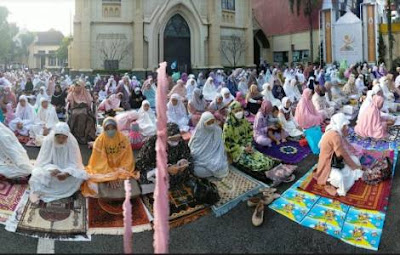Ramadan, the ninth month of the Islamic lunar calendar, holds profound significance for Muslims around the world, including those in Indonesia, the world's largest Muslim-majority country. With a population that encompasses diverse ethnicities, languages, and cultures, Indonesia's celebration of Ramadan is a vibrant tapestry of customs, gastronomy, and religious offerings that reflect the country's rich Islamic heritage.
Origins and Significance:
The observance of Ramadan in Indonesia traces its origins back to the arrival of Islam in the archipelago centuries ago. Over time, Ramadan has become deeply ingrained in the fabric of Indonesian society, shaping the cultural landscape and fostering a sense of communal identity among Muslims across the vast archipelago.
Customs and Traditions:
Ramadan in Indonesia is marked by a myriad of customs and traditions that vary from region to region, reflecting the diverse cultural heritage of the country's islands. Families gather for the pre-dawn meal known as sahur, fueling themselves for the day ahead of fasting with a hearty spread of rice, noodles, and savory dishes.
As the sun sets, the call to prayer echoes across villages, towns, and cities, signaling the time for iftar, the breaking of the fast. Indonesians break their fast with a diverse array of dishes, including traditional favorites such as ketupat (rice cakes), opor ayam (chicken cooked in coconut milk), and kolak (a sweet dessert made with bananas, sweet potatoes, and palm sugar).
Throughout the month, mosques are adorned with colorful lights and decorations, and communities come together for special nightly prayers known as Taraweeh. The atmosphere is one of camaraderie and spiritual reflection, as Muslims engage in acts of worship, recite verses from the Quran, and seek forgiveness for their sins.
Gastronomy:
Indonesia's culinary diversity shines during Ramadan, with each region offering its own unique specialties and flavors. From the spicy dishes of Padang in Sumatra to the aromatic curries of Java and the seafood delights of Sulawesi, Ramadan is a time to indulge in a smorgasbord of culinary delights.
Street vendors set up makeshift stalls selling an array of iftar delicacies, from sate (grilled skewered meat) and bakso (meatball soup) to gorengan (deep-fried snacks) and es buah (fruit ice). The bustling night markets, known as pasar malam, come alive with the sights, sounds, and smells of Indonesian cuisine, offering a sensory feast for visitors and locals alike.
Religious Offerings:
Ramadan in Indonesia is not only a time for feasting but also a period of spiritual devotion and religious offerings. Muslims engage in acts of charity, known as zakat, by donating to those in need, providing meals for the less fortunate, and supporting charitable organizations.
Additionally, Indonesians observe the Night of Power, or Malam Nisfu Sya'ban, during the middle of Ramadan, believed to be a night of forgiveness and blessings. Many Muslims also embark on spiritual retreats, known as iktikaf, during the last ten days of Ramadan, seeking solitude and contemplation in mosques and religious centers.
In conclusion, Ramadan in Indonesia is a celebration of faith, community, and cultural diversity. Through its customs, gastronomy, and religious offerings, Ramadan brings Indonesians together in a spirit of unity and solidarity, transcending differences of language, ethnicity, and region. As Muslims across the archipelago come together to observe this sacred month, they embody the values of compassion, generosity, and devotion, enriching the cultural tapestry of Indonesia and fostering a sense of harmony and goodwill among all communities.





.jpg)

.jpg)

No hay comentarios:
Publicar un comentario